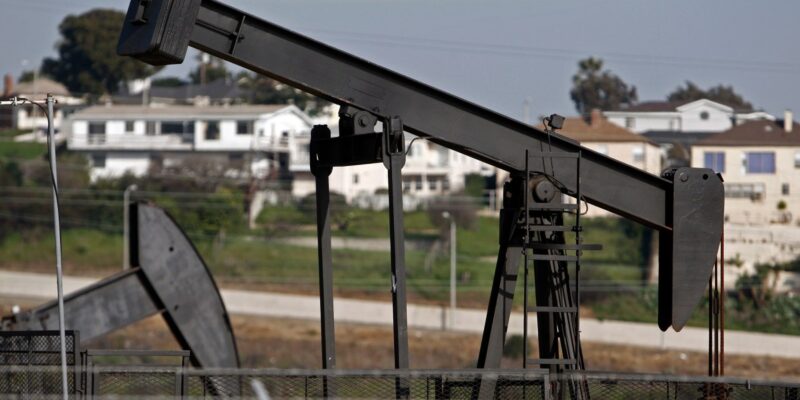
This piece was originally published by Capital & Main.
Over the last few years, as California has introduced stronger regulations on oil and gas drilling aimed at protecting public health, a pattern of events has started to emerge.
Here’s how it typically goes: After years of advocacy, environmentalists successfully push for new oil and gas drilling regulations. Then the industry fights back; companies pour money into an anti-regulation referendum, buying advertising and hiring canvassers to claim that they’re protecting jobs. Though they’re accused of misleading people into signing their petitions, the tactic works as regulations are suspended until voters have a final say.
That scenario—in which, for example, oil giants including Aera and Chevron spent $7 million to gather signatures and sway Ventura County voters, who elected to toss out local restrictions on oil drilling projects in 2022—is now being repeated, but on a much bigger scale.
This time, the industry is taking aim at California’s setbacks law, SB 1137, which bans new and reworked wells within 3,200 feet of homes, schools and hospitals and was signed with much fanfare by Gov. Gavin Newsom in September 2022. On Feb. 3, California Secretary of State Shirley Weber certified that referendum after canvassers collected 978,610 signatures. The state agency that oversees oil and gas drilling has since suspended the law pending the vote on the referendum on Nov. 5, 2024.
“It’s like I’m having PTSD seeing the same playbook they did on a smaller level, now on a larger level,” said Tomás Rebecchi, Central Coast organizing manager for Food and Water Watch, who organized for years to pass the doomed setbacks ordinance in Ventura County.
Now the industry is planning the same for the whole state. A PAC organized by the California Independent Petroleum Organization (CIPA) spent over $20 million on signature gathering, with some of the biggest donors rushing to put new wells in the prohibited zone last year. Most of the funds were sent to PCI Consultants, the same firm contracted by the fast food industry to overturn state legislation meant to improve fast food workers’ wages and working conditions.
As was the case in Ventura County, canvassers were accused of using misleading or false information to persuade some people to sign petitions. Two job postings uncovered by climate advocates declared that petition circulators would be asking for signatures in order to stop high gasoline prices—a falsehood. Shortly before the referendum qualified for a statewide vote in November 2024, CIPA’s PAC released an ad blaming expensive gasoline on low in-state oil production.
Rebecchi hopes the results in Ventura County aren’t an omen for the state, where industries have the power to overturn popular regulations through the sheer force of their influence and money.
“The governor needs to double down and own it and fight back,” he said.
In the two years between the signature gathering for the Ventura County and statewide referenda, Newsom has seized on fossil fuel regulations as one front in a larger battle, embracing sharp rhetoric against producers as part of his climate agenda. This fight has hinged on high gasoline prices throughout 2022 as a main political sticking point.
“Wasn’t enough for greedy oil companies to inflate gas prices. Now they want to drill near daycares & schools,” his personal account tweeted on the day the state certified the referendum. “They would rather risk your health than sacrifice a single cent. Disgusting.”
Newsom came out as a strong supporter of the setbacks law after advocates spent years lobbying lawmakers and agencies for it based on the health risks of living near oil and gas drilling operations. (At one time, these harms were still the subject of debate among officials, thanks to industry talking points; now they’re taken as a given.)
The fight over the setbacks law also comes amid major changes in global energy trends. Last year saw a record rise in oil industry profits tied to supply disruptions stemming from Russia’s ongoing war with Ukraine. Chevron, which is both a driller and refiner of oil in the state, more than doubled its profits over the previous year, raking in a stunning $35.5 billion. Chevron is now massively increasing purchases of its own stock, padding investors’ wallets even more.
But those stratospheric profits didn’t correspond to a big rise in oil production. While the company produced more barrels overall in the U.S. than the year before, its worldwide production actually fell. In California, Chevron produced 8 million fewer barrels in 2022 than 2021, reflecting a general decline across the state’s top oil regions.
In response to record high gasoline prices throughout the year—which Consumer Watchdog found to be highest in California because of intentional “price gouging” by Chevron and four other refiners—Newsom called for a special session to impose a financial penalty on companies.
So far, there are few details of what this could look like. The Legislature appears to have little appetite for Newsom’s proposal. Lawmakers contacted by Capital & Main declined to comment publicly about ongoing negotiations.
It could take the form of a profit margin cap in which companies would send excess profits to the state above a certain threshold, and could add up to billions going back to Californians, said Consumer Watchdog’s Jamie Court, whose advocacy has been critical to sparking the governor’s interest in a penalty.
The industry is “threatening not only consumers with unreasonable profits, but also they are threatening the entire climate change platform by weaponizing gas prices—they’ve used their ability to price gasoline too high in California as a way of discrediting our climate laws,” Court told Capital & Main.
A letter from last June to top state lawmakers from the Western States Petroleum Association, the top industry group in the state, shows how the industry uses high gasoline prices as a way to fight safe-distance regulations on drilling.
In the letter from Catherine Reheis-Boyd to Assembly Speaker Anthony Rendon (D-Paramount), obtained by Capital & Main via records request, the oil group pinned blame for expensive gasoline on programs and regulations meant to lower emissions, including Cap and Trade and the Low Carbon Fuel Standard, both of which are funded by a gasoline tax paid by consumers.
The letter also complained about the state’s plans to phase out fossil fuel cars by 2035, and singled out the setbacks bill, which at that point still hadn’t been passed, as a leading reason for high pump prices.
“California continues to pursue an aggressive agenda to ban all in-state production of fossil fuels, while at the same time, demand in the state continues to grow,” Reheis-Boyd wrote, also citing Newsom’s ban on issuing fracking permits.
The idea that increasing in-state production will lower gasoline prices is false, according to California Energy Commission Chair David Hochschild.
“The reality is 40 percent of the oil industry’s approved permits in California are still valid but have not yet been used, and the price increase is occurring at the refining stage of gas production, not the oil extraction stage,” Hochschild said in a statement last October.
WSPA wasn’t involved in the referendum to overturn the setbacks law, says Kevin Slagle, the association’s vice president of strategic communications. But it opposes the law and believes restrictions on in-state drilling will restrict Californians’ oil supplies, affecting prices.
“As these politically based policies hit the public and don’t work and they’re expensive, the public backlash against these policies is what will sink climate progress,” Slagle told Capital & Main.
Pro-drilling state legislators are running with the industry’s talking points by introducing a slate of bills in the special session to shore up fossil fuel power in California.
Sen. Shannon Grove (R-Bakersfield) introduced a bill that is a rehash of one from last year, ostensibly meant to monitor emissions from oil imported via tankers but in reality meant to bolster a pro-drilling industry talking point, as Capital & Main reported. The idea that imported oil is dirtier has also figured prominently in industry ads against the setbacks bill.
Another bill backed by oil-friendly legislators would suspend the LCFS and its associated gasoline tax for a year. While controversial, the LCFS has helped replace petroleum fuel in the state with relatively cleaner sources.
However the Legislature lands on the financial penalty bill, setbacks have become a proxy for the state’s ability to withstand industry pressure on climate policy and public health. Some environmental justice advocates are hopeful that momentum is on their side.
“What they don’t understand is that they’re betting against people power,” said Kobi Naseck, coordinator for environmental justice coalition VISIÓN, in a written statement. “They’re betting against Californians, and they’re going to lose.”
Copyright Capital & Main















